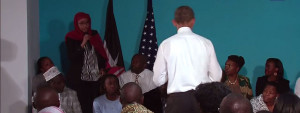Women, Terrorism, and Violent Extremism
In 2015, on the occasion of the 15th anniversary of UNSCR 1325, the UN Security Council adopted resolution 2242 (2015). UNSCR 2242 emphasizes the changing global context of peace and security and the rise of violent extremism as a key challenge for the WPS agenda. The Council in its resolution urges Member States to promote gender sensitive research and data collection on the drivers of radicalization of women and the impacts of counter-terrorism strategies on women’s human rights and women’s organizations.
While the creation of synergies between the 1325/WPS and the counter terrorism agendas are to be welcomed, members of these communities do not mix and they often mistrust or ignore each other. If we want to advance both the 1325/WPS and the counter-terrorism agendas, we need to bring these two communities together. Both communities have much to learn from each other. UNSCR 2242 invites the development of constructive platforms for interaction between the two communities.
WIIS, with its global network, is particularly well placed to bring these two communities together. Indeed, WIIS has a strong track record in both communities. We believe that an analysis of violent extremism, through a gender lens, will contribute to the design of preventative policies and will increase our understanding of the motivations for young men and women to join violent extremist groups.
Though these ideas are convincing, we do not know how gender inequality and gender norms further violent extremism on a structural level and how these gender rigidities lead a person to become a violent extremist on an individual level. It is therefore critical that more research is undertaken. WIIS will undertake a study that will focus on and advance our knowledge of:
1) The role of women in terrorist and violent extremist organizations, including the gendered dimensions of radicalization;
2) The relationship between gender inequality and the use of violence by extremist groups, including the use of sexual and gender-based violence;
3) The role and capacity of women’s organizations to prevent and counter violent extremism.

With the generous support of the Embassy of Liechtenstein in Washington, D.C., WIIS will facilitate a series of expert roundtables to explore the role of women in terrorist and violent extremist organizations, including the gendered dimensions of radicalization. These roundtables will provide a forum for bringing together an international group of experts and policymakers from the counter-terrorism and Women, Peace, and Security (WPS) communities. Key takeaways and recommendations of expert roundtables will be captured and disseminated in the form of policy briefs.
Expert Roundtable Discussions
October 12, 2016
The fourth roundtable in our series on women, terrorism, and violent extremism focused on cultural and organizational differences. Experts discussed how the different extremist organizations developed historically, the role of gender within different groups and how that changed over time, and how the local cultures impact extremist groups and the impact the extremists had on the local culture. Watch the event here.
June 20, 2016
The third roundtable in our series on women, terrorism, and violent extremism focused on past, current, and future counterterrorism (CT) and countering violent extremism (CVE) programming, the role of gender in CT/CVE programming, and how our knowledge has evolved over time. Experts also discussed which initiatives have been successful and why, with the goal of informing future programming. Listen to the discussion here: Part 1 and Part 2.
May 19, 2016
The second roundtable in our series on women, terrorism, and violent extremism explored the differences in radicalization and recruitment across cultures, terrorist organizations, and gender and how the Women, Peace, and Security agenda changes our understanding of the push and pull mechanisms. Panelists considered what a gender-sensitive research agenda on extremist radicalization and recruitment would look like and how the counterterrorism and WPS communities can learn from each other.
March 21, 2016
This roundtable kicked off a series of exploratory discussions on women, terrorism, and violent extremism. Panelists discussed the effectiveness of our policy responses and how gender dynamics affect the root causes of violent extremism and terrorism, as well as how gender should be incorporated into current policy initiatives.
Policy Briefs
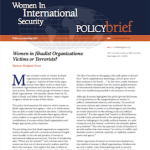
Many scholarly works on women in jihadi organizations emphasize women’s lack of agency.1 Authors of these works argue women have fallen victim to these male-
dominated organizations and thus have lost control over their actions. However, certain groups of women in some jihadi organizations—for example, Islamic State (or IS), Jaish al-Fatah, and Jabhat Fateh al-Sham—enjoy a degree of agency within the scope of their duties.
This policy brief examines the extent to which women in jihadi organizations have agency—that is, to which extent they are able to make independent decisions. Understanding the conditions under which women have agency, allows policy makers to recognize the diversity of roles and contributions of women within jihadi organizations and design appropriate policy responses.
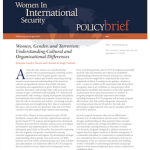
As the idea that women can and should play pivotal roles in preventing and countering violent extremism (P/CVE) gains greater traction, decision makers and scholars must keep striving toward a more nuanced understanding of the historical, cultural, and gendered contexts that enable extremist movements and organizations to grow. Without study, research, discussion, and stronger links with local actors and scholars to gain contextual understanding, U.S. analysts and policymakers risk creating a catalog of programs and policies internationally that include and empower women but fail to stem the tide of extremism and violence. Increasing women’s empowerment and strengthening their roles in community life, peace, and security are important steps, but even these can fail or backfire without deep cultural understanding.
In June 2016, Women In International Security (WIIS) facilitated a round-table event that explored how national gender-based P/CVE policies and programs have developed. Panelists discussed flaws, missteps, and successes in program development and implementation. In October 2016, a subsequent panel built on this earlier discussion by exploring the role of gender and gender considerations among extremist organizations and regions. By developing a stronger understanding of how gender roles and norms can differ between and even within extremist groups over time, scholars and policymakers can build more effective P/CVE programs that are tailored to local cultural and social gender norms.
As observed in our earlier policy brief, “Women, Gender, and Terrorism: Policies and Programming,” programs that optimistically target gender or women specifically as agents and actors have suffered from four main problems.
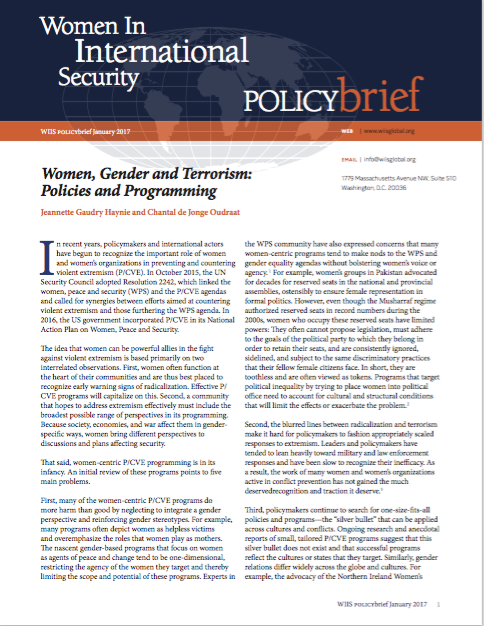
In recent years, policymakers and international actors have begun to recognize the important role of women and women’s organizations in preventing and countering violent extremism (P/CVE). In October 2015, the UNSecurity Council adopted Resolution 2242, which linked the women, peace and security (WPS) and the P/CVE agendas and called for synergies between efforts aimed at countering violent extremism and those furthering the WPS agenda. In 2016, the US government incorporated P/CVE in its National Action Plan on Women, Peace and Security.
The idea that women can be powerful allies in the fight against violent extremism is based primarily on two interrelated observations. First, women often function at the heart of their communities and are thus best placed to recognize early warning signs of radicalization. Effective P/CVE programs will capitalize on this. Second, a community that hopes to address extremism effectively must include the broadest possible range of perspectives in its programming. Because society, economies, and war affect them in gender- specific ways, women bring different perspectives to discussions and plans affecting security.
That said, women-centric P/CVE programming is in its infancy. An initial review of these programs points to five main problems, which are explored in this policy brief.
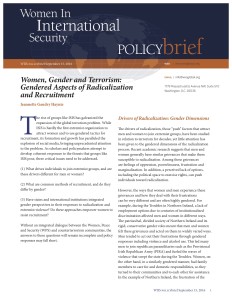
The rise of groups like ISIS has galvanized the expansion of the global terrorism problem. While ISIS is hardly the rst extremist organization to attract women and to use gendered tactics for
recruitment, its formation and growth has paralleled the explosion of social media, bringing unprecedented attention to the problem. As scholars and policymakers attempt to develop coherent responses to the threats that groups like ISIS pose, three critical issues need to be addressed.
(1) What drives individuals to join extremist groups, and are these drivers di erent for men or women?
(2) What are common methods of recruitment, and do they differ by gender?
(3) Have states and international institutions integrated gender perspectives in their responses to radicalization and extremist violence? Do these approaches empower women to resist recruitment?
Without an integrated dialogue between the Women, Peace and Security (WPS) and counterterrorism communities, the answers to these questions will remain incomplete and policy responses may fall short.
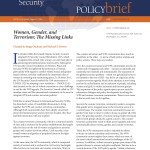
The first Policy Brief draws on the first roundtable discussion, held on March 20, 2016. This roundtable featured four noted experts: Ms. Sanam Anderlini, Co-founder and Executive Director of the International Civil Society Action Network (ICAN); Dr. Kathleen Kuehnast, Senior Gender Advisor at the United States Institute of Peace (USIP); Dr. Paul Pillar, former official of the Central Intelligence Agency (CIA) and now a non-resident Senior Fellow at the Brookings Institution; and Dr. Lorenzo Vidino, Director of the Program on Extremism at George Washington University’s Center for Cyber and Homeland Security. For more on this event, see wiisglobal.org/events.
Other Relevant Reports
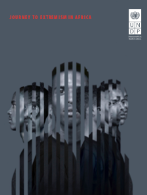
WIIS Horn of Africa’s Fauziya Abdi Ali contributed to the report. Undertaken as part of the UNDP Africa PVE programme, the Journey to Extremism in Africa study has been a complex two-year intervention explicitly designed to respond to knowledge and evidence gaps – building on earlier work exploring perceptions on radicalization, violence and insecurity in the Sahel. Specifically, it aims to generate improved understanding about the incentives and drivers of violent extremism, as expressed by recruits to the continent’s deadliest groups themselves.
WIIS-HoA (pronounced “wise-ho-ah”) focuses on gender, peace, and security issues within the Horn of Africa. Headquartered in Kenya, WIIS-HoA supports the development of cross-border networks in the region and seeks to identify good practices in peace and security in neighboring countries (Djibouti, Ethiopia, Somalia and Tanzania).
WIIS-HoA partners with numerous local civil society organizations to prevent and combat violent extremism in Kenya and the region. One such organization is Women without Borders. Women without Borders brings together courageous and determined women to create a new female security paradigm. Women without Borders encourages women to become active participants in their communities, to co-shape their present and their future. Importantly, Women without Borders also promotes the role of women in the security sphere and sensitizes mothers in particular to their role and responsibility to challenge violent extremist ideologies. More specifically, WIIS-HoA with its partners works to prevent and counter violent extremism through:
1) building community resilience especially women and youth;
2) building capacity of law enforcement, security actors on CVE through enhancing trust through methods used;
3) understanding the drivers of radicalization especially amongst youth; and
4) understanding the role of diaspora especially with regard to radicalization trends of EU born youth in Somaliland.
WIIS HoA is led by Fauziya Abdi Abdi. Ms. Abdi is the founder and President of WIIS Kenya and chair of Sisters without Borders, a network of Kenyan organizations devoted to the prevention of violent extremism. Click here to learn more about Fauziya and WIIS HoA.
Resources
Reports on Counter-Terrorism and Countering Violent Extremism by Inclusive Security
Uncomfortable Truths, Unconventional Wisdoms – Women’s Perspectives on Violent Extremism and Security Interventions – Women’s Alliance for Security Leadership
A Gendered Approach to Countering Violent Extremism – Brookings Institute
Women Preventing Violet Extremism: Charting a New Course – United States Institute of Peace
Does CVE Work? – Global Center on Cooperative Security
Countering Violent Extremism: A Peacebuilding Perspective – United States Institute of Peace
A Man’s World? Exploring the Roles of Women in Countering Terrorism and Violent Extremism – Hedayah and Global Center on Cooperative Security
Department of State and USAID Joint Strategy on Countering Violent Extremism

